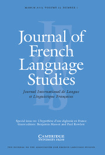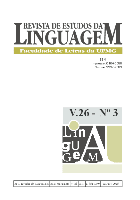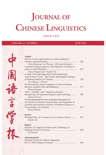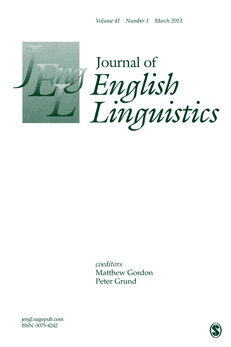
Journal of French Language Studies
Scope & Guideline
Pioneering Insights into the French Language Landscape
Introduction
Aims and Scopes
- Linguistic Variation and Change:
The journal emphasizes studies that investigate the variation and change within the French language, including phonological, syntactic, and semantic shifts across different regions and communities. - Sociolinguistics and Language Policy:
A significant focus is on the sociolinguistic dimensions of French, including the impact of language policies on regional dialects and the dynamics of language use in multicultural contexts. - Language Acquisition and Teaching:
Research on the processes and methodologies involved in learning French as a second language, including innovative approaches like the use of media in vocabulary acquisition, is prominently featured. - Historical Linguistics:
The journal includes studies that trace the historical development of the French language from its pre-classical roots to contemporary usage, analyzing diachronic changes. - Pragmatics and Discourse Analysis:
Papers often explore pragmatic aspects of French, including the use of discourse markers, intonation patterns, and the role of context in communication. - Dialectology and Regional Studies:
The examination of regional variants of French, particularly in Francophone regions, is a core theme, reflecting the diversity of the French language globally.
Trending and Emerging
- Digital Linguistics and Social Media:
Research exploring the implications of digital communication, including language use on social media platforms and the impact of technology on language evolution, is becoming increasingly relevant. - Gender and Linguistic Inclusivity:
Studies examining gender-neutral language and the sociolinguistic implications of gendered forms in French are on the rise, reflecting broader societal discussions on inclusivity. - Pragmatic and Discourse Analysis in Varied Contexts:
There is a growing focus on the pragmatic aspects of language use in diverse contexts, with particular attention to how discourse markers and intonation affect communication. - Language and Identity:
Emerging research is increasingly linking language use to identity formation, particularly in multilingual and multicultural contexts, highlighting the interplay between language, culture, and self-perception. - Variationist Sociolinguistics:
A trend towards variationist approaches that analyze language use in real-time across different social groups and contexts is gaining momentum, reflecting a shift towards empirical, data-driven research.
Declining or Waning
- Traditional Grammar Studies:
There has been a noticeable decrease in papers focusing solely on traditional grammar rules and structures, as the field moves towards more dynamic and contextually relevant linguistic analysis. - Morphological Studies of Standard French:
Research specifically centered on standard morphological structures appears to be declining, possibly due to a growing interest in vernacular and regional dialects. - Historical Textual Analysis:
While historical linguistics remains relevant, the focus on analyzing classical texts or traditional literature in isolation has diminished, giving way to more integrated approaches that consider contemporary relevance. - Prescriptive Language Norms:
There seems to be a waning interest in prescriptive norms of the French language, as scholars increasingly advocate for descriptive approaches that recognize language as a living, evolving entity.
Similar Journals

Glossa-A Journal of General Linguistics
Championing Innovative Scholarship in LinguisticsGlossa: A Journal of General Linguistics, published by the Open Library of Humanities, stands as a leading voice in the realm of linguistic research since its inception in 2016. With its Q1 category ranking in Linguistics and Language and impressive Scopus ranks encompassing the top 83rd and 81st percentiles in its respective fields, Glossa fosters a vibrant academic community committed to the rigorous exploration of language and linguistic theory. Operating under an open access model, the journal not only enhances the visibility of groundbreaking research but also ensures that valuable insights are accessible to a global audience. The journal's commitment to interdisciplinary dialogue makes it an indispensable resource for scholars, professionals, and students eager to engage with contemporary developments in linguistics. As it converges into 2024, Glossa continues to champion innovative scholarship and critical discourse that challenges conventional boundaries within the field.

Estudios de Linguistica-Universidad de Alicante-ELUA
Connecting Scholars and Ideas in the Linguistic RealmEstudios de Linguistica-Universidad de Alicante-ELUA is a distinguished academic journal dedicated to advancing the field of linguistics, published by Universidad de Alicante. With an Open Access model adopted since 2020, ELUA facilitates greater accessibility to pioneering research for scholars and enthusiasts alike. The journal's ISSN is 0212-7636 and its E-ISSN is 2171-6692, ensuring it is indexed and easily discoverable in academic databases. Though the journal's H-Index is currently not specified, its commitment to disseminating high-quality linguistics research positions it as a valuable resource for researchers, professionals, and students. The journal aims to foster scholarly dialogue and innovation in various linguistic domains, making it an essential platform for sharing insights and findings that shape contemporary linguistic studies. Based in Alicante, Spain, ELUA is poised to contribute significantly to the global linguistics landscape.

Yuyan Kexue-Linguistic Sciences
Fostering Scholarly Exchange in Language StudiesYuyan Kexue-Linguistic Sciences, published by SCIENCE PRESS, is a pivotal academic journal dedicated to the field of linguistics. With its ISSN of 1671-9484, this journal seeks to explore and illuminate various linguistic phenomena, contributing significantly to the understanding of language in both theoretical and applied contexts. Emphasizing interdisciplinary research, it welcomes contributions that bridge linguistics with areas such as cognitive science, sociology, and communication studies. Although it currently does not offer open access, Yuyan Kexue-Linguistic Sciences aims to provide a platform for researchers, professionals, and students alike to engage with cutting-edge studies and emerging trends in linguistics. Its publication location in Beijing positions it as a vital contributor to the global discourse in the linguistic sciences, catering to both a national and international audience. As the journal continues to grow, it aspires to maintain high academic standards and foster scholarly exchange for years to come.

Revista de Estudos da Linguagem
Fostering Collaboration in Language StudiesRevista de Estudos da Linguagem, an esteemed academic journal published by the Universidade Federal de Minas Gerais within its Faculty of Letters, serves as a vital resource for scholars in the fields of linguistics and education. Since its inception in 1992, the journal has embraced an open access model, ensuring that research is accessible to a broader audience, thereby fostering collaboration and knowledge dissemination. Based in Brazil, this journal focuses on a wide array of topics related to language studies, contributing significantly to the discourse within the linguistics community. While recent rankings place it in Q4 in Education and Q3 in Linguistics and Language categories, its dedication to publishing high-quality research continues to attract attention despite its current Scopus rankings. The journal notably ranks at #668 in Language and Linguistics, verifying its emerging impact in the academic landscape. Researchers and students alike will find the journal's commitment to diversity in linguistic research a compelling reason to engage with its articles. The journal's offices are located at AV ANTONIO CARLOS, 6627 PAMPULHA, BELO HORIZONTE, MG, BRAZIL, and it continues to invite contributions that challenge established norms and explore innovative themes within the dynamic realm of language studies.

Cadernos de Estudos Linguisticos
Empowering knowledge through accessible linguistic research.Cadernos de Estudos Linguisticos, published by UNIV ESTADUAL CAMPINAS, INST ESTUDOS LINGUAGEM, stands as a pivotal platform in the field of linguistic studies since its inception in 1978. With its commitment to Open Access, this journal fosters the dissemination of cutting-edge research, ensuring that knowledge is accessible to a global audience. This also enhances collaboration among researchers, professionals, and students dedicated to exploring the nuances of language. The journal proudly carries the ISSN 0102-5767 and E-ISSN 2447-0686, attesting to its uninterrupted quality and relevance in linguistic scholarship. By addressing various facets of language studies, including syntax, semantics, and sociolinguistics, this esteemed journal is a vital resource for advancing understanding and innovation in the field.

Language and Linguistics Compass
Charting New Territories in Language and LinguisticsLanguage and Linguistics Compass, published by Wiley, stands as a premier journal in the field of linguistics, showcasing innovative and interdisciplinary research. With its ISSN 1749-818X and E-ISSN matching, the journal has built a robust reputation, achieving an impressive Q1 ranking within the linguistics category for 2023, placing it in the top 4% of its field. Its Scopus rank of 48 out of 1167 highlights its influence and significance among linguistics journals, boasting a commendable 95th percentile. This journal serves as a vital resource for researchers, professionals, and students, offering a wide range of accessible articles that illuminate current trends and advances within the domain of language studies. Although it is not Open Access, the journal is committed to quality and diversity in its publications, ensuring scholarly articles from various sub-disciplines of linguistics are represented from 2008 through 2024. Located in the United Kingdom, Language and Linguistics Compass invites contributions from around the globe, reinforcing its status as a leading forum for linguistic discourse.

Slovo a Slovesnost
Charting New Territories in Language ResearchSlovo a Slovesnost is a prominent academic journal dedicated to the field of linguistics and language studies, published by the Czech Language Institute of the Czech Academy of Sciences. With an ISSN of 0037-7031, the journal has established itself as a significant resource for researchers and professionals within the linguistic community. Its rigorous selection process and impactful contributions have earned it a commendable Q2 ranking in Linguistics and Language as of 2023, as well as Scopus rankings in the 58th percentile for Language and Linguistics. Offering insights into both theoretical and applied linguistics, Slovo a Slovesnost serves as an essential platform for cutting-edge research, fostering dialogue among scholars, and enriching the study of language within the Czech Republic and beyond. Although it does not provide open access, the journal supports a subscription model that ensures high-quality dissemination of knowledge to a dedicated audience of linguists, educators, and linguistic scholars. With coverage converging from 2004 to 2024, it continues to thrive as a vital corner of linguistic scholarship.

Languages
Advancing linguistic frontiers through open dialogue.Languages, published by MDPI, is a prestigious open-access journal dedicated to the field of Linguistics and Language studies. Since its inception in 2016, this journal has rapidly established itself as a leading platform for high-quality research, achieving an impressive Q1 ranking in 2023 and standing out in both the Arts and Humanities as well as the Social Sciences categories with significant percentile rankings (76th and 74th respectively). Based in Switzerland, Languages fosters an international community of scholars who are committed to exploring the multifaceted dimensions of language, from theoretical frameworks to practical applications. With a robust e-ISSN of 2226-471X, the journal prioritizes accessibility, allowing researchers, professionals, and students to freely engage with cutting-edge research and insights. By bridging the gap between theory and practice, Languages plays a crucial role in advancing our understanding of linguistic phenomena, making it an invaluable resource for anyone invested in the study of language.

JOURNAL OF CHINESE LINGUISTICS
Exploring Linguistic Diversity Through a Chinese LensJOURNAL OF CHINESE LINGUISTICS, published by the JOURNAL CHINESE LINGUISTICS, is a prominent periodical that serves as a vital resource for researchers and scholars in the fields of linguistics and Chinese studies. With its ISSN 0091-3723, this journal has been contributing to the academic community since 1996 and continues to publish innovative research until 2024. Although it is classified in the third quartile (Q3) for both Arts and Humanities and Linguistics categories, its focus on Chinese linguistics positions it uniquely within this specialized domain. The journal is committed to advancing the understanding of Chinese language structures, usage, and context, encouraging interdisciplinary dialogue among linguists and language researchers. While currently not labeled as open access, the journal remains accessible to institutions and scholars worldwide, creating an invaluable platform for disseminating knowledge. As such, it plays a critical role in promoting linguistic diversity and cultural awareness within the academic landscape.

JOURNAL OF ENGLISH LINGUISTICS
Elevating the Standards of English Linguistic ResearchJOURNAL OF ENGLISH LINGUISTICS, published by SAGE PUBLICATIONS INC in the United Kingdom, is a premier scholarly journal dedicated to advancing the field of linguistics through a rigorous exploration of the English language. With its ISSN 0075-4242 and E-ISSN 1552-5457, this quarterly journal boasts an impressive impact factor and maintains a notable standing within the academic community, evidenced by its Q1 ranking in Linguistics and Language. Its rich history, covering publications from 1967 to 2024, ensures that it remains an essential resource for researchers, professionals, and students alike, fostering critical discourse and innovative research in English linguistics. While the journal is not open access, it offers a wealth of valuable insights and cutting-edge findings that are vital for anyone interested in understanding the complexities of language structure, usage, and evolution. For those seeking to stay at the forefront of linguistic scholarship, JOURNAL OF ENGLISH LINGUISTICS represents an indispensable cornerstone in the field.